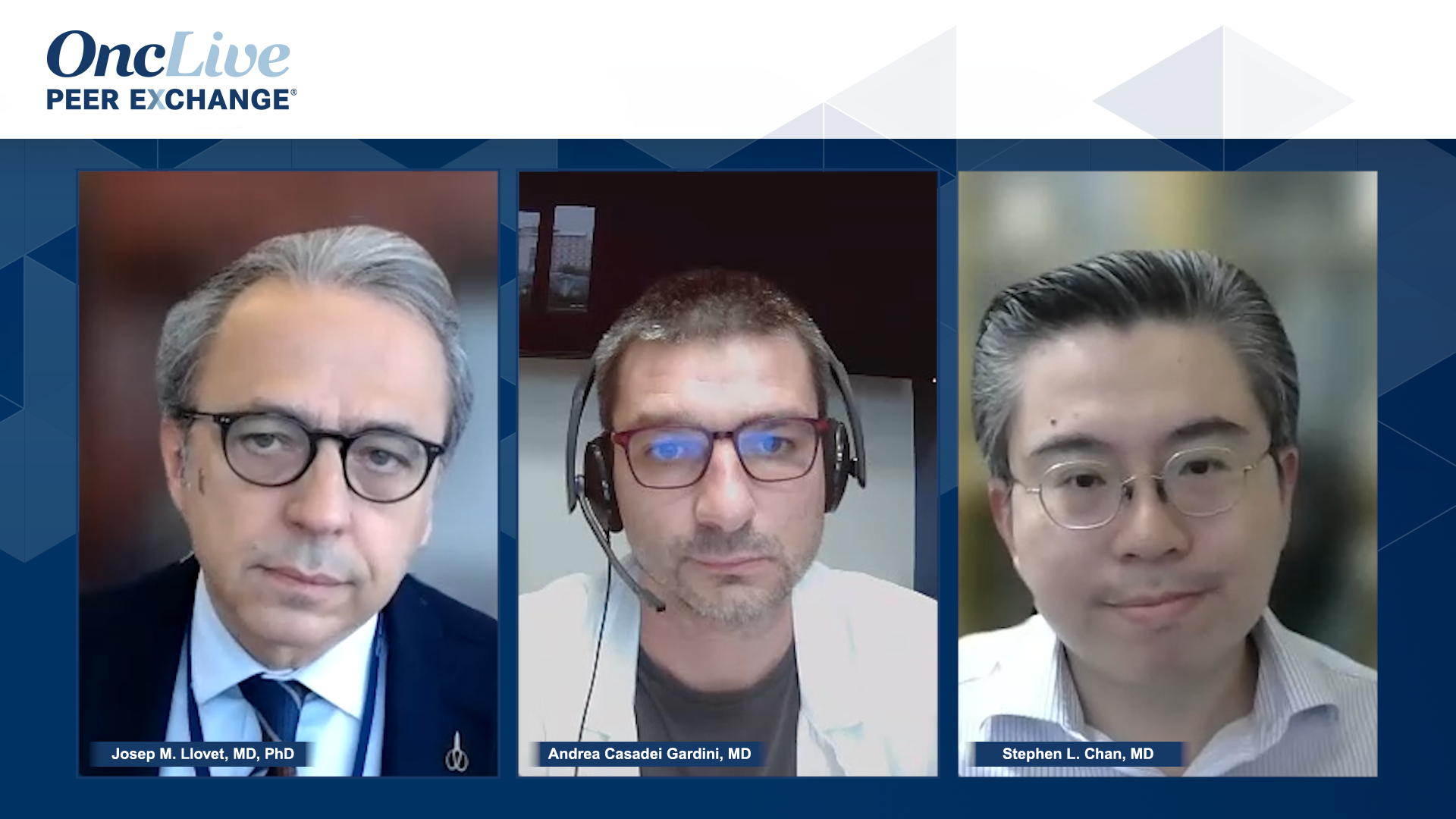- Advertise
- About OncLive
- Editorial Board
- MJH Life Sciences brands
- Contact Us
- Privacy
- Terms & Conditions
- Do Not Sell My Information
2 Clarke Drive
Suite 100
Cranbury, NJ 08512
© 2025 MJH Life Sciences™ and OncLive - Clinical Oncology News, Cancer Expert Insights. All rights reserved.
Future Directions for HCC Management
Drs Josep Llovet, Stephen L. Chan, and Andrea Casadei Gardini discuss the future treatment landscape for HCC.
Josep M. Llovet, MD, PhD:I want to thank the speakers for this rich and informative discussion. Before we conclude, I would like some final thoughts from each of you. It’s clear that we don’t have a standard of care in the adjuvant setting after resection or collaboration in HCC [hepatocellular carcinoma], but promising data have been reported in the neoadjuvant setting for checkpoint inhibitors. In the adjuvant setting, there are 5 phase 3 randomized control trials assessing either single agents or combinations that may change the landscape of management. In intermediate stage, after 15 years the standard of care is chemoembolization. In some areas Y-90 [yttrium-90] might be used as an alternative, but we don’t have strong or level 1 evidence to add systemic therapies yet. But again, there are at least 5 randomized controlled trials combining TACE [transarterial chemoembolization] with systemic therapies versus TACE alone. There is one trial, RENOTACE, that is combining TKIs [tyrosine kinase inhibitors] and checkpoint inhibitors head-to-head to TACE in patients with high tumor burden.
In terms of advanced HCC, there is another revolution, we have atezolizumab and bevacizumab, we have sorafenib and lenva [lenvatinib], and around 20% of patients in the West but slightly more in Asia at this point are receiving these indications in the front line. Now the HIMALAYA trial data have emerged, and we have the Chinese KEYNOTE paper on pembro [pembrolizumab] versus placebo, which is positive. These may add to the trend that we’re seeing in prior Western studies, to consolidate the indication by the FDA. There are a lot of data and more trials coming. We are familiar with LEAP-002, which is combining lenva and pembro [lenvatinib and pembrolizumab]; the COSMIC-312, progression-free survival with atezo, cabo [atezolizumab and cabozantinib]; the CheckMate 9DW, nivo/ipi [nivolumab plus ipilimumab]; and others. There already are data with camrelizumab and apatinib, so a lot of trials are coming.
We are in a good situation; in the following years we will envision changes in the management that will be a new revolution, and will result in positive tools for improving the outcome of our patients. Please Dr Chan, give us your closing thoughts.
Stephen L. Chan, MD:In the next 2 or 3 years, the treatment for HCC will not just be improved, but likely revolutionized. In systemic treatment, we have a lot of combinations and sequences. It will change dramatically, and as we discussed there may be something released in a few years in the adjuvant or even neoadjuvant settings. We also may have important clinical trial data on how to improve the treatment in the BCLC [Barcelona Clinic Liver Cancer] stage B HCC. And last but not least, we now have learned that the etiology may potentially be crucial, especially NASH [nonalcoholic steatohepatitis], for the outcome of a patient treated with immunotherapy. We expect there will be much more data and discussion in the future. Thank you.
Josep M. Llovet, MD, PhD:Thank you very much. Dr Casadei, your final closing thoughts?
Andrea Casadei Gardini, MD:I hope that in the future we will use systemic therapy before locoregional therapy; the street is open now with ongoing study. As for etiology, it’s important for the future because we have more options for our patients and we can decide on the basis of 2, 3, or 4 points, patient characteristics, etiology, tumor board, or other parameters. The revolution is ongoing.
Josep M. Llovet, MD, PhD:Thank you for joining our panel. We hope you found this OncLive® Peer Exchange discussion to be useful and valuable to the treatment of your patients with HCC.
Transcript Edited for Clarity
Related Content:





